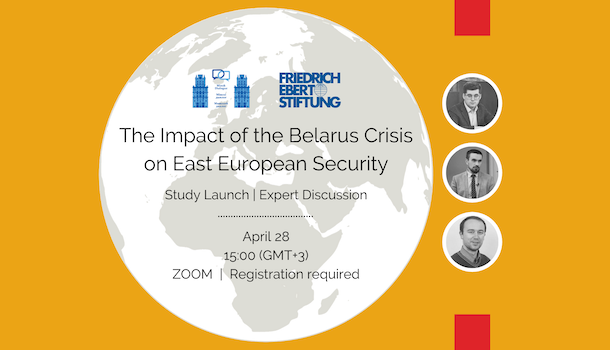Venue: Zoom; Live on Facebook (https://fb.me/e/3ZNFKRXal)
Format: research report launch followed by a moderated panel discussion
Working languages: Russian and English (with simultaneous interpretation)
Organizers: Minsk Dialogue Council on International Relations and Friedrich-Ebert-Stiftung
The political crisis in Belarus has had evident international implications, including for regional security in Eastern Europe. If anything, it has disrupted Belarus’s relations with the neighbours in the west and south, as well as with the EU and USA. The security dialogue Minsk conducted with NATO and some of its member states before the summer of 2020 has also been undermined. Numerous commentators maintain that the degree of damage to the relations is beyond repair and that the regional situation will inevitably see a profound transformation.
At the same time, other experts point out that strategically the Belarus crisis has not yet brought any fundamental changes to the interests of key actors in Eastern Europe. In particular, Belarus maintains a longer-term easy-to-understand interest in alleviating regional security tensions, whereas NATO continues to stress the value of minimising military risks and enhancing military transparency. Importantly, Belarus remains the only country in the region that possesses practical infrastructure for controlling the East European “security dilemma”.
The online event will take a closer look at the ramifications the Belarus crisis has had for regional security and for Minsk’s ability to play a constructive role as a stabiliser of military tensions in Eastern Europe. It will begin with the presentation of the study The Role and Impact of Small States in Promoting Peace and Security in Eastern Europe: The Case of Belarus, which the Minsk Dialogue Council on International Relations has conducted in cooperation with the Friedrich-Ebert-Stiftung. The presentation will be followed by a panel discussion with the authors of the study and invited experts.
Please join us for this online presentation and panel discussion, which will be held in ZOOM. Please register via https://forms.gle/3x6sfwKF73oTRxoB9 or join the live stream on Facebook at https://fb.me/e/3ZNFKRXal. To ask a question during the event, please use ZOOM chat or the Facebook comment section.
Introduction
Christopher Forst
Director of Regional Office Dialogue Eastern Europe, Friedrich-Ebert-Stiftung, Representative for Belarus
Authors of the study
Yauheni Preiherman
Director, Minsk Dialogue Council on International Relations
Dzianis Melyantsou
Сoordinator of the Belarus’s Foreign Policy Programme, Minsk Dialogue Council on International Relations
Siarhei Bohdan
Researcher, Friedrich Meinecke Institute of History of the Freie Universität Berlin; Expert Council member, Minsk Dialogue Council on International Relations
Invited speakers
Pavel Matsukevich
Senior Fellow, Centre for New Ideas
Valerу Karbalevich
Expert, Analytical Centre Strategy
Moderator
Alisiya Ivanova
Junior Analyst, Minsk Dialogue Council on International Relations


